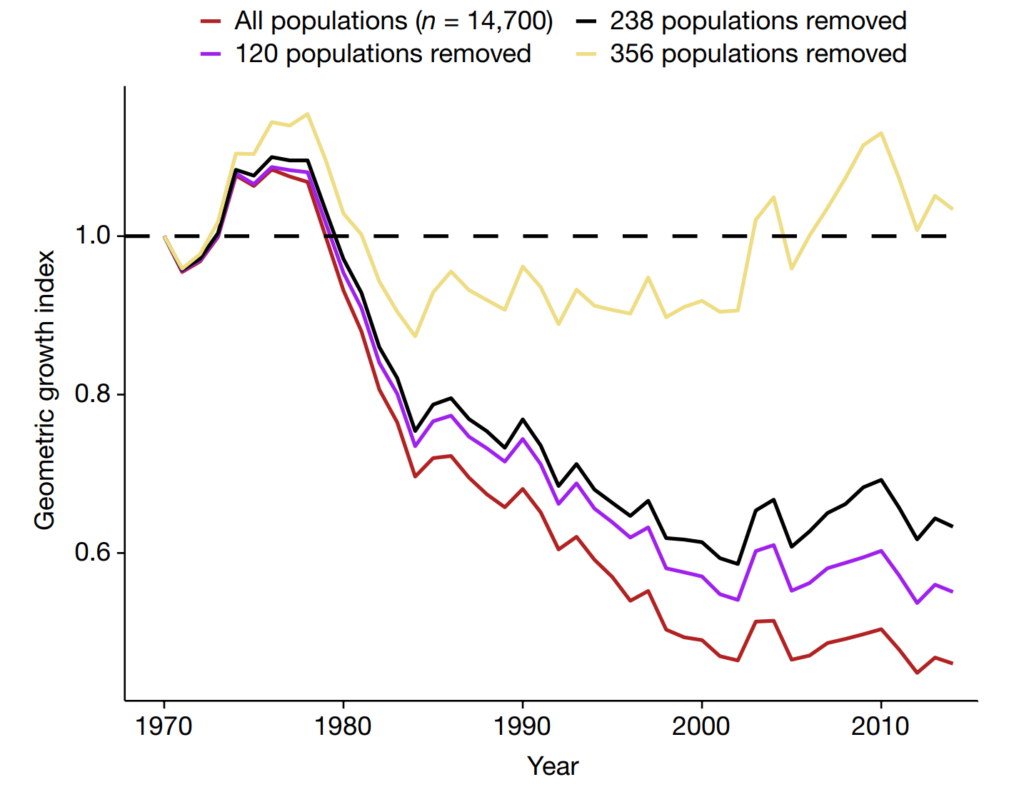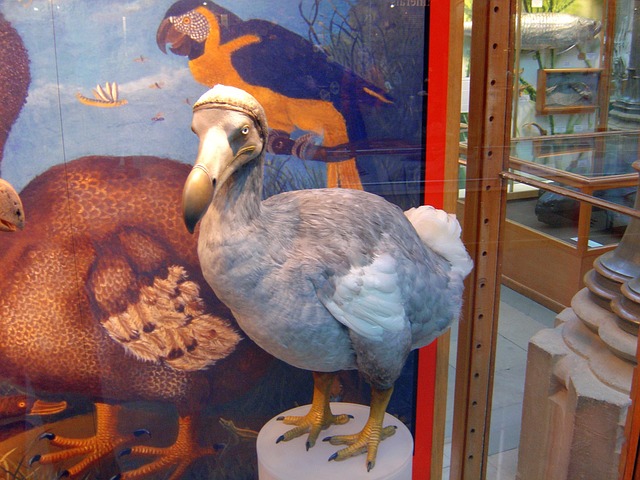- Dramatic stories of extinctions and destruction of wildlife are highly emotional and drive widespread concern.
- Closer examination of studies that claim to estimate human influence on rates of species extinction reveal them to be unsound.
- This important and published scientific debate is of little interest to news producers or campaigners.
Many campaigners, NGOs, journalists, politicians and some scientists claim that we are in the midst of a “biodiversity crisis” or a “sixth mass extinction”. According to these stories, climate change is one of a number of anthropogenic factors responsible for killing life on Earth at a rate which is equivalent to cataclysmic changes in natural history, such as the destruction of the dinosaurs.
Much of these claims are based on the Living Planet Index (LPI), which is generated by the global conservation charity WWF and the Zoological Society of London from their database of worldwide vertebrate population trends.
The index represents the average change in population size since 1970 of many thousands of species of fish, amphibians, reptiles, birds and mammals for which data are available. It has been published biannually since 1998. And every two years, the figure seems to suggest a worsening picture of the planet’s biodiversity and the health of its species. In 1998, it stood at 30%. That is, vertebrate populations had reduced in size by an average of 30% since 1970. By 2020, it had reached 68%.
The claim that we’ve lost more than two thirds of the planet’s vertebrates in only fifty years deserves to be taken seriously, of course, and it has been taken very seriously indeed. The LPI is quoted routinely in government reviews, by environmental groups, the World Economic Forum, campaigning journalists, activist scientists and erstwhile Governors of the Bank of England [4 mins]. The WWF itself is proud of the LPI’s “pivotal role” in the implementation of international environmental agreements, such as the Convention on Biological Diversity.
But no scientific metric can be taken seriously until it has been seriously scrutinised. During the two decades that the LPI has been taken at face value by the media and scientists, it has taken on a life of its own. Whereas the LPI intends to measure population numbers and to highlight population declines in particular, erroneous claims that the LPI refers to species extinctions have gone largely unnoticed and uncorrected. Recently, though, one team of researchers have taken a closer look, and their analysis, published in 2020 in the journal Nature, suggests that the LPI paints a picture of global biodiversity trends that bears little resemblance to reality.
Averages conceal variation. And this is their intended function: to remove noise from noisy data. But in situations when a few data points have a dramatic influence on the average, averaging can introduce error. That’s exactly what McGill University’s Brian Leung and his colleagues found when they reanalysed the data used to generate the LPI. By removing just 2.4% of the data points – the 356 most drastically declining populations out of a total of 14,700 –the average trend shifted to zero, or even a slight increase.

Declining populations are, it turns out, rare exceptions rather than the rule. This is good to know. At the very least, it presents an opportunity to target conservation efforts to where they are most needed. But the green political agenda demands that we protect all of life on Earth rather than focus resources on a vulnerable handful of species. So, while the LPI is rolled out every two years to media fanfare, Leung’s study, which contradicts the political narrative, despite its publication in a high-profile scientific journal, has raised little interest from the world’s media. That’s something that Leung and his co-authors predicted. As they write in their paper: “The most apocalyptic models gather extensive press coverage, even when based on controversial data.”
This lack of interest in new research and debate reveals that concern over the state of the planet’s biodiversity is often about more than science, and less about conservation than how to reorganise society. In the fourth of his Reith lectures for the BBC in 2021, titled ‘From climate crisis to real prosperity,’ Mark Carney uses the LPI to argue explicitly for reconfiguring markets around environmental values. The political utility of metrics like the LPI sit in direct opposition to the need for scientific integrity.
Until the political influence on our understanding of species extinction and population health is understood and criticism is allowed into debates to combat it, it is unlikely that a clear understanding of human impact and the success of conservation policies will be achieved. Researchers who study animal populations discover a different picture to the stories presented by powerful green lobbying groups, which are often embedded in research organisations, face harassment and cancellation by their peers. This political pressure has distorted the public’s understanding of the natural world.
The polar bear, for example, has long been held as a symbol of climate change destroying a fragile ecosystem. According to many campaigning organisations, melting ice puts a huge question mark over the animal’s future. But Canadian polar bear researcher Susan Crockford discovered that the data supporting these claims was weak, and that polar bear populations were in fact thriving compared with population studies in earlier decades. She pointed out that despite the ice loss seen between the middles of the 2000s and 2010s, polar bear populations had not suffered as had been expected.
For speaking out against alarmist claims about the predicted loss of an iconic species, Crockford was the subject of a campaign to remove her from her academic position, and personal attacks on her work, from within and without the field. Debate between academic researchers is the essence of academia, and how society can achieve an objective understanding of the natural world. But Crockford is one of an increasing number of academics who have been attacked not on the basis of their research, but because its findings depart from the political narrative. This hostility casts doubt on the independence of academic institutions, and the quality of the research they produce.
